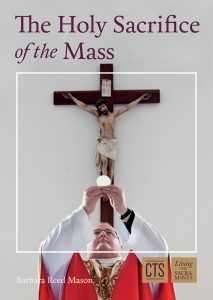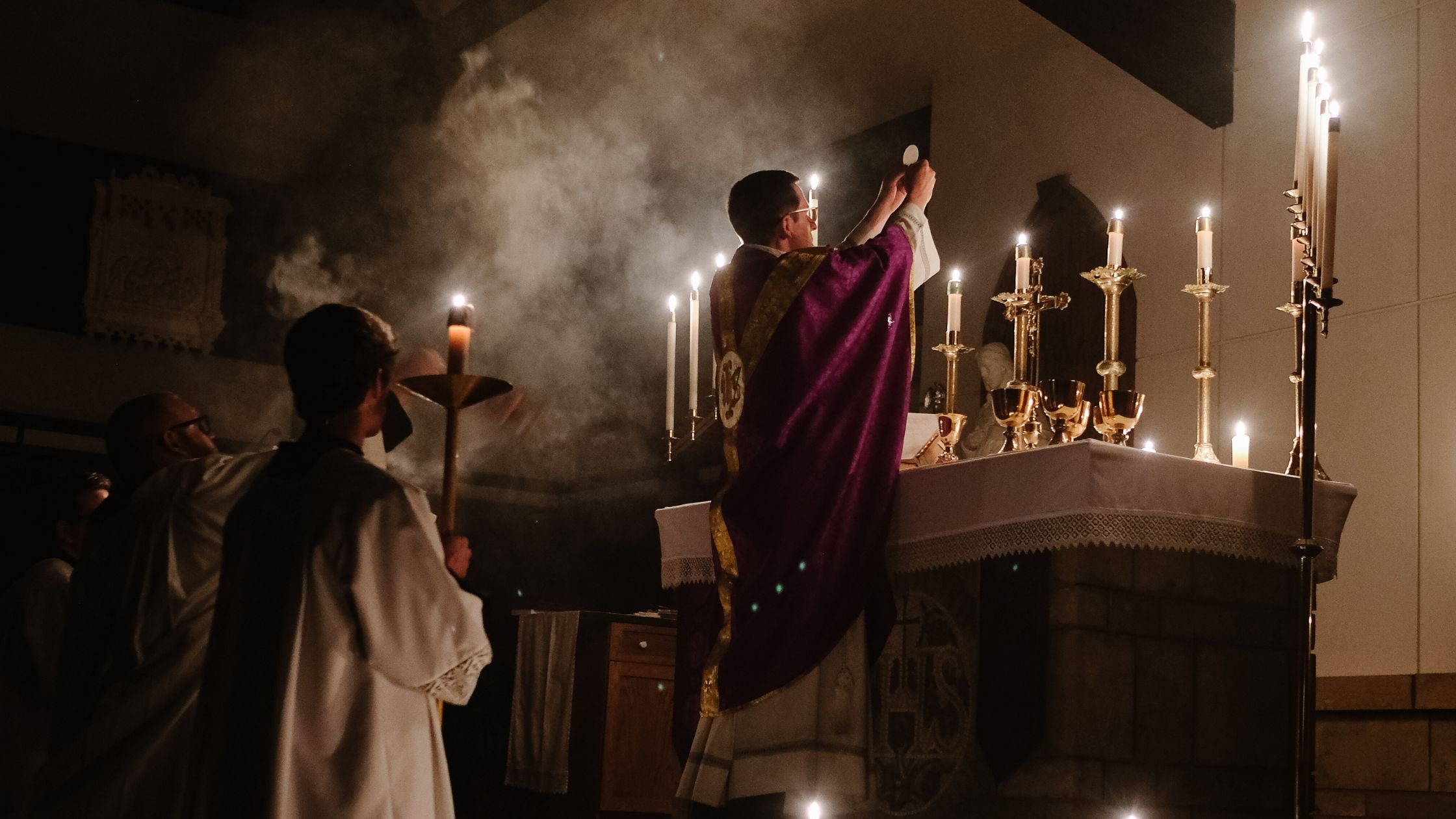God created us so that we can know him, not merely know about him! The Church tells us:
- “Through divine revelation, God chose to show forth and communicate himself and the eternal decisions of his will regarding the salvation of men. That is to say, he chose to share with them those divine treasures which totally transcend the understanding of the human mind.” (Dei Verbum 6, author’s emphasis)
- “Of all visible creatures, only man is ‘able to know and love his creator’. He is the only creature on earth that God willed for its own sake, and he alone is called to share, by knowledge and love, in God’s own It was for this end that he was created, and this is the fundamental reason for his dignity.” (CCC 356)
- “God himself is an eternal exchange of love, Father, Son and Holy Spirit, and he has destined us to share in that exchange.”(CCC 221)
It is a great shame that there is only one word for “know” in the English language. Other languages, such as French and Spanish, have two. The French use the verbs savoir and connaître, the former meaning to know facts or information, the latter referring to a personal familiarity, to “know by experience”. In Spanish, the distinctive words for “know” are saber and conocer. Saber is used in the context of knowing information or ideas, while conocer – “to be familiar with” – is used in the context of personally knowing a person or a place.
Knowing God
Faith in God does not merely refer to knowing truths about him, it also includes knowing him through his revelation of himself, experiencing his extraordinary personal love for us. He wants a relationship of familiarity with us, which he initiates and we respond to. In his Apostolic Letter Desiderio Desideravi (DD), Pope Francis reminds us:
We may not even be aware of it, but every time we go to Mass, the first reason is that we are drawn there by His desire for us… For our part, the possible response… is, as always, that surrender to this love, that letting ourselves be drawn by Him. (DD 6)
St Augustine spent his youth searching for truth, but after his encounter with Christ, he wrote in his Confessions, “You have made us for yourself, O Lord, and our hearts are restless until they rest in You.”
Man’s faculties make him capable of coming to a knowledge of the existence of a personal God. But for man to be able to enter into real intimacy with him, God willed to both reveal himself to man and to give him the grace of being able to welcome this revelation in faith. (CCC 35)
Pope Benedict XVI explained that “faith does not just mean accepting a certain number of abstract truths… Faith consists in an intimate relationship with Christ”.
St John Paul II declared that “faith…is neither an abstract discourse nor a vague religious sentiment, but a personal encounter with Christ who gives new meaning to life”. Speaking to the European bishops, he insisted that: “Without the vibrance of this encounter, Christianity becomes a soulless religious traditionalism which easily yields to the attacks of secularism or the enticements of alternative religious offerings”.
The assistance of the Holy Spirit is essential
In his encyclical on the Holy Spirit, Pope John Paul II gave a wonderfully helpful definition of faith: “Faith, in its deepest essence, is the openness of the human heart to the gift: to God’s self-communication in the Holy Spirit.”4 “Heart” here is meant “in the biblical sense of the depths of one’s being, where the person decides for or against God” (CCC 368). We need to ask the Holy Spirit to help us to open our hearts to him:
Faith is a gift of God, a supernatural virtue infused by him. “Before this faith can be exercised, man must have the grace of God to move and assist him; he must have the interior helps of the Holy Spirit, who moves the heart and converts it to God, who opens the eyes of the mind and makes it easy for all to accept and believe the truth.” (CCC 153)
Catholic teaching has always recognised two aspects to faith, which it distinguishes by the terms fides quae (objective revealed truth given by God through Sacred Scripture and the Church’s teaching Tradition) and fides qua (the personal surrender and commitment to God inspired in us by the Holy Spirit). Clearly, both aspects of faith are essential to our lives as Catholics, but without fides qua our faith remains lifeless and impersonal.
The encounter with Christ
We comprehend mystery when we encounter the Risen Jesus. “Only the action of the Spirit can bring to completion our knowledge of the mystery of God, for the mystery of God is not something grasped mentally but a relationship that touches all of life. Such experience is fundamental” (DD 39).
When we experience a living intimacy with the Lord, we find that at Mass “every gesture and every word…is always new because it meets with an always new moment in our lives” (DD 53). Mass can never be boring!
There are times when I have inwardly gasped at the words the priest says as he adds a drop of water to the wine in the chalice: “By the mystery of this water and wine may we come to share in the divinity of Christ who humbled himself to share in our humanity.” The momentousness of that reality is so awesome that one almost needs a time of silence to respond with heartfelt gratitude and joy.
Since God created us to know him personally and to respond to his love, this means that it is possible, and necessary, to encounter Christ Jesus. Many are afraid of an encounter with Jesus because they intuit that their lives would inevitably change. Even though the Lord says in both the Old and the New Testaments that “you must love the Lord your God with all your heart, with all your soul, and with all your mind” (Dt 6:4-5; Mt 22:37), they fear being perceived by others as a “fanatic”.
Pope Benedict XVI addressed these fears in his first homily as Pope:
Are we not perhaps all afraid in some way? If we let Christ enter fully into our lives, if we open ourselves totally to him, are we not afraid that he might take something away from us? Are we not perhaps afraid to give up something significant, something unique, something that makes life so beautiful? Do we not then risk ending up diminished and deprived of our freedom? No! If we let Christ into our lives, we lose nothing, nothing, absolutely nothing of what makes life free, beautiful and great. No! Only in this friendship are the doors of life opened wide. Only in this friendship is the great potential of human existence truly revealed. Only in this friendship do we experience beauty and liberation.
And so, today, with great strength and great conviction, on the basis of long personal experience of life, I say to you, dear young people: Do not be afraid of Christ! He takes nothing away and he gives you everything. When we give ourselves to him, we receive a hundredfold in return. Yes, open, open wide the doors to Christ – and you will find true life. Amen.
Pope John Paul II began his ministry with a similar proclamation: “Do not be afraid! Open wide the doors for Christ!”
In his first encyclical, Pope Francis invited “all Christians, everywhere, at this very moment, to a renewed personal encounter with Jesus Christ, or at least an openness to letting him encounter them”. He exhorted:
I ask all of you to do this unfailingly each day. No one should think that this invitation is not meant for him or her, since “no one is excluded from the joy brought by the Lord”. The Lord does not disappoint those who take this risk; whenever we take a step towards Jesus, we come to realise that he is already there, waiting for us with open arms. (Evangelii Gaudium 3)
The liturgy: place of encounter with Christ
Referring to the Mass, Pope St Paul VI declared: “The liturgy is the first source of divine communion in which God shares his own life with us” (cited in DD 30). When the Word of God is proclaimed, it is Christ himself who is speaking to us. When we receive Holy Communion, we are receiving the Risen Christ, as Pope Francis explains:
Here lies the powerful beauty of the liturgy. If the resurrection were for us a concept, an idea, a thought; if the Risen One were for us the recollection of the recollection of others, however authoritative, as for example, of the Apostles; if there were not given also to us the possibility of a true encounter with him, that would be to declare the newness of the Word made flesh to have been all used up. Instead, the Incarnation, in addition to being the only always new event that history knows, is also the very method that the Holy Trinity has chosen to open to us the way of communion. Christian faith is either an encounter with him alive, or it does not exist. The Liturgy guarantees for us the possibility of such an encounter. (DD 10, 11)
Pope Francis continues:
It becomes clear that knowledge of the mystery of Christ, the decisive question for our lives, does not consist in a mental assimilation of some idea but in real…engagement with his person. In this sense Liturgy is not about “knowledge”… The celebration concerns the reality of our being docile to the Spirit who operates through it until Christ be formed in us (cf. Ga 4:19)… This is the purpose for which the Spirit is given, whose action is always and only to confect the Body of Christ. (DD 41, author’s emphasis)
 This blog is extracted and adapted from The Holy Sacrifice of the Mass by Barbara Reed Mason. Every time the Mass is celebrated something astonishing occurs: the Sacrifice of Jesus Christ on the Cross is made truly present. Drawing on Sacred Scripture, the Catechism, and the words of saints and popes, this book explains how the Sacrifice of the Mass unites the faithful with God.
This blog is extracted and adapted from The Holy Sacrifice of the Mass by Barbara Reed Mason. Every time the Mass is celebrated something astonishing occurs: the Sacrifice of Jesus Christ on the Cross is made truly present. Drawing on Sacred Scripture, the Catechism, and the words of saints and popes, this book explains how the Sacrifice of the Mass unites the faithful with God.
Learn more about the sacrificial nature of the Mass and support the mission of CTS by ordering your copy of The Holy Sacrifice of the Mass today.
